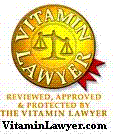"Supporting Industry Compliance with FDA and FTC Regulations."
Page Index:
· Index
· Contact Me
· Top
The Vitamin Lawyer Consultancy
www.vitaminlawyer.com
Ralph Fucetola JD
Traditional Uses
|
|
Index: Legal Question: To what extent can evidence of historical or Traditional Use information regarding herbs and other nutrients be used to substantiate Dietary Supplement Claims? Here are some source materials from the FTC and FDA that impinge on this issue, and the Vitamin Lawyer's comments.
Claims Based on Traditional Uses "Claims based on historical or traditional use should be substantiated by confirming scientific evidence, or should be presented in such a way that consumers understand that the sole basis for the claim is a history of use of the product for a particular purpose. A number of supplements, particularly botanical products, have a long history of use as traditional medicines in the United States or in other countries to treat certain conditions or symptoms. Several European countries have a separate regulatory approach to these traditional medicines, allowing manufacturers to make certain limited claims about their traditional use for treating certain health conditions. Some countries also require accompanying disclosures about the fact that the product has not been scientifically established to be effective, as well as disclosures about potential adverse effects. At this time there is no separate regulatory process for approval of claims for these traditional medicine products under DSHEA and FDA labeling rules."
FTC continues - "In assessing claims based on traditional use, the FTC will look closely at consumer perceptions and specifically at whether consumers expect such claims to be backed by supporting scientific evidence. Advertising claims based solely on traditional use should be presented carefully to avoid the implication that the product has been scientifically evaluated for efficacy. The degree of qualification necessary to communicate the absence of scientific substantiation for a traditional use claim will depend in large part on consumer understanding of this category of products. As consumer awareness of and experience with "traditional use" supplements evolve, the extent and type of qualification necessary is also likely to change. "There are some situations, however, where traditional use evidence alone will be inadequate to substantiate a claim, even if that claim is carefully qualified to convey the limited nature of the support. In determining the level of substantiation necessary to substantiate a claim, the FTC assesses, among other things, the consequences of a false claim. Claims that, if unfounded, could present a substantial risk of injury to consumer health or safety will be held to a higher level of scientific proof. For that reason, an advertiser should not suggest, either directly or indirectly, that a supplement product will provide a disease benefit unless there is competent and reliable scientific evidence to substantiate that benefit. The FTC will closely scrutinize the scientific support for such claims, particularly where the claim could lead consumers to forego other treatments that have been validated by scientific evidence, or to self-medicate for potentially serious conditions without medical supervision. "The advertiser should also make sure that it can document the extent and manner of historical use and be careful not to overstate such use. As part of this inquiry, the advertiser should make sure that the product it is marketing is consistent with the product as traditionally administered. If there are significant differences between the traditional use product and the marketed product, in the form of administration, the formulation of ingredients, or the dose, a "traditional use" claim may not be appropriate. "Example 29: The advertiser of an herbal supplement makes the claim, "Ancient folklore remedy used for centuries by Native Americans to aid digestion." The statement about traditional use is accurate and the supplement product is consistent with the formulation of the product as traditionally used. However, if, in the context of the ad, this statement suggests that there is scientific evidence demonstrating that the product is effective for aiding digestion, the advertiser would need to include a clear and prominent disclaimer about the absence of such evidence. "Example 30: A supplement manufacturer wants to market an herbal product that has been used in the same formulation in China as a tonic for improving mental functions. The manufacturer prepares the product in a manner consistent with Chinese preparation methods. The ad claims, "Traditional Chinese Medicine — Used for Thousands of Years to Bring Mental Clarity and Improve Memory." The ad also contains language that clearly conveys that the efficacy of the product has not been confirmed by research, and that traditional use does not establish that the product will achieve the claimed results. The ad is likely to adequately convey the limited nature of support for the claim. "Example 31: A supplement manufacturer markets a capsule containing a concentrated extract of a botanical product that has been used in its raw form in China to brew teas for increasing energy. The advertisement clearly conveys that the energy benefit is based on traditional use and has not been confirmed by scientific research. The ad may still be deceptive, however, because the concentrated extract is not consistent with the traditional use of the botanical in raw form to brew teas and may produce a significantly different effect. "Example 32: A supplement ad claims that a supplement liquid mineral solution has been a popular American folk remedy since early pioneer days for shrinking tumors. The ad is likely to convey to consumers that the product is an effective treatment for cancer. There is no scientific support for this disease benefit. Because of the potential risks to consumers of taking a product that may or may not be effective to treat such a serious health condition, possibly without medical supervision, the advertiser should not make the claim." We can see from the above FTC analysis that RISK and BENEFIT will be weighed on a spectrum of risk – at one end are products that support natural structure and function and at the other end are products that claim to treat life-threatening diseases. The FDA has some points to add to the mix,
http://www.cfsan.fda.gov/~dms/fdsupp.html “One thing dietary supplements are not is drugs. A drug, which sometimes can be derived from plants used as traditional medicines, is an article that, among other things, is intended to diagnose, cure, mitigate, treat, or prevent diseases. Before marketing, drugs must undergo clinical studies to determine their effectiveness, safety, possible interactions with other substances, and appropriate dosages, and FDA must review these data and authorize the drugs' use before they are marketed. FDA does not authorize or test dietary supplements. “A product sold as a dietary supplement and touted in its labeling as a new treatment or cure for a specific disease or condition would be considered an unauthorized--and thus illegal--drug. Labeling changes consistent with the provisions in DSHEA would be required to maintain the product's status as a dietary supplement.” If a claim is not an allowed Wellness or Structure Function Claim, or a forbidden Medical Claim, it may be a Health Claim (a claim that characterizes the relationship between a nutrient and a disease). Some of these have been allowed, often only after a court fight.
http://www.cfsan.fda.gov/~dms/hclmgui2.html The essence of the current American rule on Traditional Uses is, as stated by FTC, “Claims based on historical or traditional use should be substantiated by confirming scientific evidence, or should be presented in such a way that consumers understand that the sole basis for the claim is a history of use of the product for a particular purpose.” Remember, FDA regulates labels while FTC regulates advertising (however, FDA can consider literature about a product to be an extension of the label). Further, the agencies will look much more closely at products that claim to cure serious disease than products that claim to support normal structure and function. Disclaimers and Disclosures need to be carefully crafted. These are the regulatory requirements that must be met to base advertising claims on the Traditional Use of a product. Here is a sample of a Traditional Use Disclaimer, "This information is based on Traditional [Chinese Medicine] which often uses natural herbs and nutrients to support health. The information about these ingredients has not been evaluated or approved by the FDA and is not based on scientific evidence from US sources. This product is intended to support general well being and not intended to treat disease. If conditions persist, please seek advise from your medical doctor." See also,
The Right of
the Public to the Truth FDA and FTC Regulations of Dietary Supplement Sales
© 2003, 2007 |
Breaking News!
Vitamin Lawyer News
Updated Often!
|
cGMPs & SoPs are Coming to the Vitamin
Industry! |
Vitamin Lawyer On Line Seminar - FREE!
Ralph Fucetola JD
Email me with questions: |
Look for the Vitamin Lawyer Oversight Seal of Approval on Nutrient Web Sites
|
|
Your web site needs a proper SUS |
|
SUPPORT LIFESPIRIT This site hosted on the net by LifeSpirit Center This site makes no representations regarding these offers. |
© 2007
Powered by
counter.bloke.com
![]()
Web Site Index:
·
Home
Page
·
Credentials
·
Services
·
Payments
·
SOPs
·
SUS
·
Forming a Company
·
Vitamin Lawyer News
·
FDA - FTC Regs
·
Links
·
International Services
·
Nutrient Picks
·
Consumers
·
Personal Importation
·
Professional Seminars
·
FREE
Online Seminar
·
Vaccine Choice
·
Site Use Statement
·
Site Map
·
Top
·
Home
Page
·
Credentials
·
Services
·
Payments
·
Oversight Seal ·
Site Use Statement
·
Top

